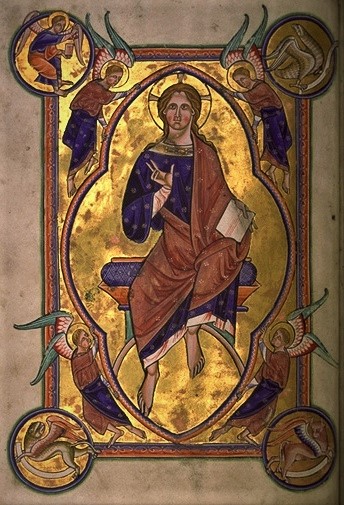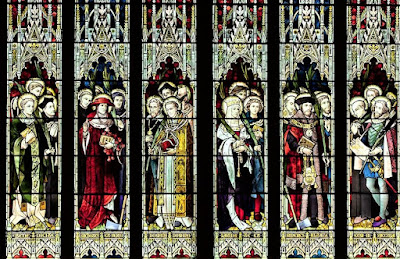We’re in the end times. We live in the last days. When our Lord Jesus Christ ascended into heaven it was the beginning of the end of the world. However permanent this world may seem, however impossible it may seem at times to resist the powers of this world, the last days of the world are bracketed by the ascension of Jesus Christ and by His return to be our Judge on the Last Day.
God has already determined when the end of this world will happen, and even if He has chosen not to share the information about the precise time with us, He knows it, and His Providence is active in bringing His work in this world to a close.
God’s most important work is, in fact, already complete. Jesus Christ, the Incarnate Son of the Father, came into this world to save it. This He has already done. He has died on the cross as the sacrifice for our sins, atoning with His own Blood for our rebellion against his Father. He has risen from the dead and He is our great High Priest, making atonement so that we may become by adoption and grace the sons of God in Him. He has already been taken into heaven, into the Holy of Holies not made with hands, into the living presence of the Father, to offer His one sacrifice of Himself for all sin, for all time, to his Father.
And now Jesus Christ is seated at the right hand of His Father in the place of the highest honour and glory, because His work of salvation is done. Every human being who will ever be saved, is saved by that one sacrifice of Christ once offered. There is no other price for sin, no other saviour, no other hope of eternal life. There is nothing that we can do to add to the pure gift of salvation that Jesus Christ has given to us and to all who believe in Him; and there is nothing that we can do, or that anyone else can do, to save those who refuse to believe, except to pray to Jesus Christ that He will intervene and save them, not by dying again, but by giving them the gift of faith in his death, resurrection, and ascension.
Our Lord’s ascension is also the proof of our salvation. Since He is true man, as well as true God, and He has taken human flesh and human life into the very presence of God, no one can ever say again that there is no place for man in heaven or before the throne of God, because man in Jesus Christ is already there. In Christ, mankind is made fit, by salvation and grace, for eternal fellowship with God, so that where Christ is now, one day, on the Last Day, all of redeemed humanity will gather before the Father’s throne in their own resurrected and glorified bodies.
Until our Lord’s return to judge the living and the dead, there is but one main task before mankind, and that is to get ready for Christ’s return and for the end of the world.
Getting ready for the end of the world, however, has nothing to do with chasing after every apparition, or listening to every persistent seer, because God has reserved the time and the hour of the end to Himself. Therefore, guessing about the end or trying to predict the end is a waste of time. Getting ready for the end of the world has nothing to do with filling our pantries with food or stocking up on other supplies, as though we would actually need them when Christ comes to give the faithful a new heaven and a new earth ruled absolutely by a good and gracious God. And getting ready for the end of the world most certainly has nothing to do with just sitting quietly and piously, waiting for the end to come.
Christ told us what to do to prepare for the end of the world, and we hear what he had to say as it is recorded in the Acts of the Apostles: “You shall receive power when the Holy Spirit has come upon you; and you shall be my witnesses in Jerusalem and in all Judea and Samaria and to the end of the earth.” (Acts 1:8).
Since the Holy Ghost descended on Pentecost, our work in the world, and the way we are to prepare for the end of the world, is to witness to Jesus Christ everywhere from our own homes and towns to the farthest reaches of the earth. To witness is not just "talking about Jesus," but it is also showing people that Jesus Christ is alive and at work in us by the Christian lives that we are living in Him.
The way we work, pray, and do charity; the way we stand up for justice, especially for the weak; the way we relax and amuse ourselves as the children of God and not as the children of fallen Adam; the way we embrace the joys and the sorrows of our lives with hope and grace: if we do these things in Christ, knowing that Christ is alive and glorious at His Father’s side and that our salvation is the already-accomplished work of the Son of God made man, then we witness to Jesus Christ by our living. It is then that we are preparing ourselves and our neighbors for the end of the world, whenever it comes.
As the angels who attended the ascension told the Apostles, we need not stare up with astonishment at the heavens. What Jesus Christ has already done is a sure and certain thing. We don’t have to gaze at it to make it true. So, also, is Christ’s Second Coming a sure and certain thing, making it completely unnecessary to watch in curiosity for Christ’s return as if watching will make it so, or that it will somehow change the timetable that God has established from before His creation of the world.
God will have His way. He will have His redeemed children in a fellowship of love forever. Jesus Christ has already made this so. Our job is to live that fellowship right now, as much as we are able, knowing that God in heaven has already decided when He will make our lives perfect by sending his Son in all His glory, to bring this world to its perfect conclusion in Him.
But it begins in us.
Fathers, love your families by being the spiritual leader they need, as St. Joseph was for the Holy Family.
Mothers, remember that you are the heart of your household, so dedicate yourselves to the Blessed Mother by asking for her prayers and following her example.
Children, obey your parents, and honour them as God’s gift to you.
And for all of us, let’s rededicate our lives to the service of Jesus Christ. Renew the promises made at your baptism. Heal those relationships that are broken. Pay attention to those around you, and see to their needs insofar as possible. This is how we honour and prepare for the return of the Risen and Ascended Lord Jesus Christ.
Grant, we beseech thee, Almighty God: that like as we do believe thy Only Begotten Son our Lord Jesus Christ to have ascended into the heavens; so we may also in heart and mind thither ascend, and with him continually dwell; who liveth and reigneth with thee, in the unity of the Holy Spirit, ever one God, world without end. Amen.
__________________________________
Pictured: "The Ascension" by Gustave Doré (1832-1883)











.jpg)


